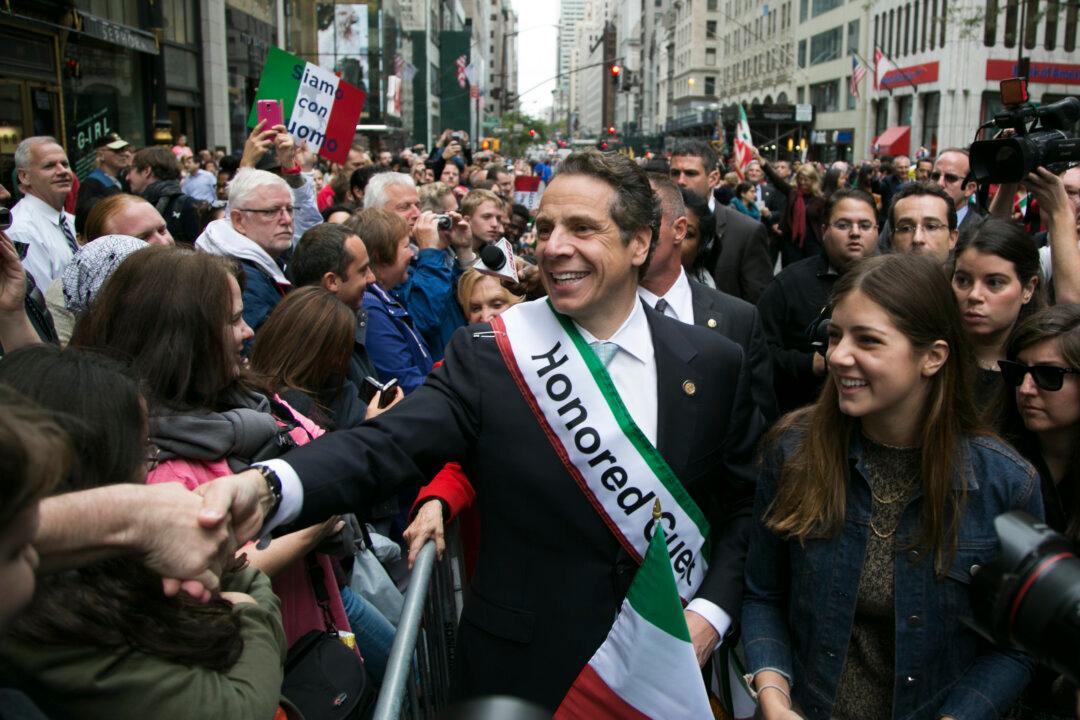NEW YORK—There were no blights on Gov. Andrew Cuomo’s march in the Columbus Day parade on Monday. Unlike the Labor Day parade last month, where Cuomo ignored his Democratic challenger Zephyr Teachout when the latter was barely inches away, the Republican gubernatorial candidate Rob Astorino made no attempts to greet Cuomo at the parade.
Cuomo had made a policy of not mentioning his opponents’ names during the campaign. He refused to acknowledge Teachout in the Democratic primary, and has given Astorino scarcely any recognition.
The silent treatment has proven effective, if polls are any indication. A survey by Quinnipiac University in October gave the governor a 20-point lead among likely voters, 51 percent to 31 percent.
More importantly, a staggering 43 percent of those surveyed said they didn’t know enough about Astorino to give an opinion.
However, Cuomo has agreed to a sole televised debate with Astorino in upstate New York. The candidates have a debate scheduled for October 22 in Buffalo, but the debate has rejected coverage from broadcast television outlets, according to the Astorino campaign.
Featuring candidates from minor parties, the event won’t be the one-on-one debate Astorino has asked for.
The governor had also agreed to a radio-only debate hosted by WNYC radio, but Astorino decided not to participate because the debate would not be televised, a standard practice for gubernatorial debates.
In neighboring Connecticut, the governor has participated in four of the seven planned debates before the election.
“Vladimir Putin debated his opponent on television in Russia, but Andrew Cuomo won’t do the same in New York,” Astorino said in a statement.
Astorino has made Cuomo’s aversion to debates a repeated point of contention. When Cuomo announced a possible trip to Puerto Rico and the Dominican Republic, Astorino sent out an email criticizing the governor for his refusal to debate offers by major Spanish language TV networks.
“If Mr. Cuomo really wants to engage in issues important to New York’s Hispanic communities rather than just pander at election time, he should debate those issues with me on Univision, New York 1 Noticias, and elsewhere,” Astorino said.
When a report asked Cuomo whether only having one debate was in line with his promise to have the “most transparent” administration in New York history, Cuomo replied “yes, totally.”
“Because I believe it is,” said Cuomo after being asked why. “When you’re governor, you can do it your way.”
A Personal Side
Although Cuomo has engaged little with his opponent, he’s kept a vigorous campaign. Last week, he toured upstate on the “Women’s Equality Express,” a tour promoting the Women’s Equality Party that he helped create.
The Women’s Equality Party (WEP) and the 10-point Women’s Equality pledge that Cuomo asked elected officials running for reelection to sign has played a prominent part of the governor’s campaigning after his victory in the primary, and has allowed Cuomo to inject a more personal side into his politicking.
On Saturday, Cuomo released a TV ad promoting the WEP that featured his partner Sandra Lee and his three daughters—whom Cuomo has frequently referenced in recent weeks—reiterating talking points like the gender wage gap and the high rate of sexual assault.
“This is a personal situation for me, I have three young ladies,” Cuomo said during his proposal for sexual assault policy reform on SUNY campuses. “I have two in college now and the third is going to go to college next year, hopefully.”
Cuomo also sought to humanize his image with the release of a 517-page memoir on Tuesday, entitled “All Things Possible: Setbacks and Success in Politics and Life.” The book touches on things the governor has spoken little about, including his failed bid for governor in 2002, and his divorce from Kerry Kennedy in 2003.
Cuomo also discusses his relationship with his father, former Gov. Mario Cuomo, who “never mentioned that he had any particular confidence in my political acumen.”
“Expressing feelings and pride in their children,” Cuomo wrote, “was not something the men of his generation did.”
The book also covers instances of personal tribulations as a politician, like Cuomo’s 2002 joke that then-governor George Pataki “held the leader’s coat,” and let then-NYC mayor Rudy Giuliani take charge of the post-9/11 efforts, but more recent trials, such as allegations that he interfered with the Moreland Commission, are not mentioned in the book.
The Associated Press contributed to this article.





